#meta perspective
Text
Kind of funny. SPN was supposed to end in s5, with Sam in Hell, Cas in Heaven, and Dean on Earth, living with a wife and a son. But it ends after ten more season later with Cas in superhell, Dean in Heaven, and Sam on Earth, living with a wife and a son. Like some fucked up game of musical chairs. Except the chairs are never taken, the song remains the same, and they’re just going in circles. Anyways, Happy November 19th.
#remember that video where Jensen expressed dislike towards the finale#and they basically told him “look at it from the fan perspective” you mean like fans from 10 years ago???#they completely acknowledged that majority of their fandom NOW would not fucking like that ending.#they brought back Becky just to tell Chuck that it fucking SUCKED.#[sigh]#supernatural#spn#spn meta#spn finale#spngate#spn 5x22#swan song#spn 15x20#carry on#chuck won theory#chuck won#team free will#tfw#sam winchester#dean winchester#castiel#destiel#reiotalks
2K notes
·
View notes
Text
So I've been thinking lately about how Mithrun is Kabru's dark mirror (more on that another time- it needs its own post), and I thought it interesting that one of their parallels is that they were both cared for by Milsiril, but in opposite directions. She took Kabru in as her foster after he was orphaned and tried to convince him not to become an adventurer. On the flip side, she helped rehabilitate Mithrun specifically so that he could rejoin the Canaries.
And I kept wondering: why?
For Kabru, obviously she loves him a whole lot- despite any other shortcomings in their relationship, I do believe that.
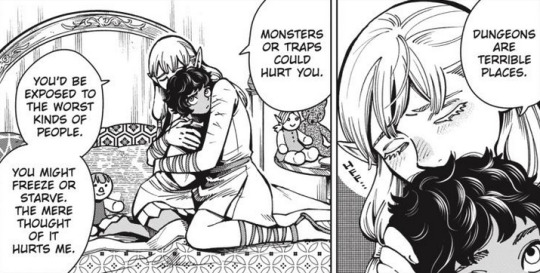
So I get why she tries to convince him not to go dungeoning, and, failing that, at least prepares him as thoroughly as she can.
But why help Mithrun? She used to hate Mithrun, but after realizing what a secretly twisted person he was, she actually thought of him more positively (oh, Milsiril). So it wasn't as if she held the kind of grudge that might motivate her to make his already-depleted life even more miserable by sending him back to the dungeons. And it wasn't that she felt bad for him either, since she didn't visit Mithrun for the first ~20 years of his recovery.
The Adventurer's Bible says that Utaya was the impetus for Mithrun returning to the Canaries, but Milsiril is the one who made the trip to see him and tell him about it.
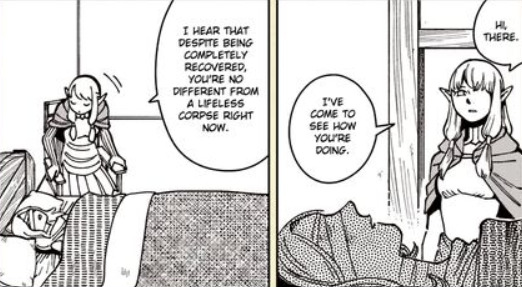

Why would Milsiril work so hard to get her old coworker back into fighting fit? Why encourage him to return to such a dangerous lifestyle, when she was the one who chose not to mercy-kill him?
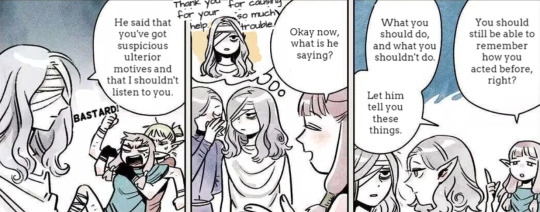
That last panel is such a crazy thing to hint at and then never elaborate on. Without it we could have just thought that Milsiril wanted the Canaries' work to continue without her, even if it seemed out of character. I think some people even assume she's just a natural caretaker as a foster mom and handwave it to include nursing Mithrun too. What could Milsiril's suspicious motives be? What does she gain from Mithrun joining the Canaries that isn't an altruistic desire to see dungeons safely sealed? Feeling a sense of responsibility for the work she left behind isn't an ulterior motive.
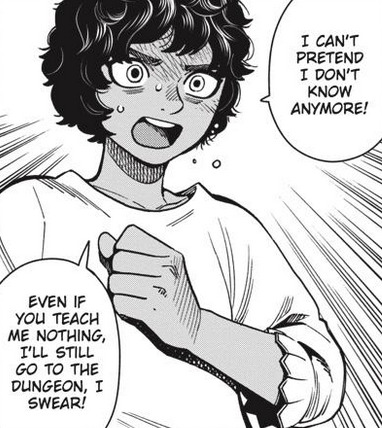
My theory is: Milsiril, knowing that Mithrun was empty save for the burning desire to face the demon again, wound him up like a clockwork doll and pointed him back at the dungeons.
Hoping that he'd eliminate the biggest threat to Kabru's life, before it was too late for him.
Milsiril the puppetmaster.

#Dungeon Meshi#Dungeon Meshi meta#Mithrun#Milsiril#Kabru#btw I'm working with the only translations I could find sorry#so keep that in mind#like it just seemed WEIRD to me#that gloomy introverted Milsiril#who left the life of a Canary behind#decided to do this Canary-adjacent work of helping this guy#maybe the queen made her do it because so many people died and they needed more Canaries idk!#but why would anyone pick Milsiril as a life coach? I really think it was her own choice#it's so interesting how we get these hints of a downright sinster Milsiril#I really like the complicated relationship she and Kabru have#struggling to fully humanize him from her elven perspective#but still taking him seriously wrt: his fears over being a monster or his desire to go to a party!#crazy stuff there#everything about Kabru and adjacent to Kabru is insane what a character#musings with Dea
906 notes
·
View notes
Text
In rewatching the season, I'm noticing how clever Aabria and Brennan were in crafting Tula's story. How well thought out everything was.
Specifically, the bear. It's been mentioned so many times before, but with the context of the completed season, I cannot help but be in awe at the skilful storytelling at display here. The way in which the Blue is described to appear wrong only in reference to Tula and her heart, the way in which Tula talks about curiosity and and having experienced knowing someone who died because of it. Of how Aabria describes to Izzy how Tula looks when she heals the bear, of how Aabria specifically points out that Tula recognises the commonalities between herself and the bear. These breadcrumbs that mean little in the beginning, that tell everything at the end. It's amazing, stunning, masterful storytelling. I am in awe.
#text_loke#meta from loke#Burrow's End#Burrow's End Spoilers#Aabria Iyengar#Brennan Lee Mulligan#i am forever in awe tbh#also the way i gasped at several of brennan and aabria's lines this episode#i'll need to pull some quotes from that whenever i get on my computer#and i desperately need to write a fic about everything that happened from Tula's perspective#but that would be AFTER i finally manage to finish the little beast i'm working on about that Last Fight from Tula's pov#'cos BOY i have a feeling i will write a lot. just 600 words on the intro before 'kill them all'. so y'know. a wordy little thing...#anyway. i love burrow's end so much. i cannot stop thinking about it#Dimension 20 Spoilers#D20 Spoilers
1K notes
·
View notes
Text
TGCF reread new finds #1
Xie Lian actively and consciously knows that he is attracted to HC the MOMENT THEY MEET in the Ox Cart. Like it’s not just blank gay panic, he knows.
His beauty was deadly like a sword, sharp and mesmerising. Xie Lian only met his eyes for a moment, then lowered his eyes in defeat.
MATE, normally wouldn’t you continue to be mesmerised and can’t peel your eyes away? That is, UNLESS YOURE WHIPPED. XL knows that SL's looks affect him to this degree. Defeat is the key word here.
Also
The distance between them had closed too fast. he suddenly didn't know what to do[...]Xie Lian blanked on the spot. He watched as the tall and slender youth walked away with his giant bag of junk as if it were the most natural thing in the world to do, and it made him mutter inwardly, Forgive my sins.
Making a rich young lad carry your things? Making him sleep in your crappy temple? That doesn't warrant the weighty thought? FORGIVE WHAT SINS Xie Lian??!!!
Many village girls saw (HC) and blushed [...] Xie Lian didn't know what they were going to ask, but felt instinctively that it must be stopped at once, and cried, "No!"
Jealous jealous boi! XL WAS POSSESSIVE after ONE night spent together at Puqi Shrine. Didn’t XL just say to SL that he will have no problem in the love department because girls will throw themselves at him? Yo, why are you cock-blocking? Everyone says HC is insane, no XL is equally insane for the other!
Also, when HC revealed that it's his real skin after the Banyue arc, XL instinctively poked him. Then
He looked at his own finger then hid it away, betraying nothing of his thoughts.
What thoughts XL ?!! Explain yourself right now!
Jumping back to OX CART scene, Xie Lian's character development was foreshadowed when they were talking about the gifting of ghost ashes.
Book 1: Xie Lian sighed. "It certainly is painful to think about, to have given everything for love and lose everything in return."
This is what Xie Lian is most afraid of! Like even thinking back to Xie Lian pushing Feng Xin away in Book 4, he definitely operated under that mindset. Love is a risk, it's something to be feared. Even now 800+ years later, he still feels that way and doesn't allow himself to get close to anyone. It just hits so much harder thinking that he operated under that for so many centuries.
Then Hua Cheng says
"What there to be afraid of? If it were me, I'd have no regrets giving away my ashes"
Which I think really changed the way that Xie Lian thought about love. Book 5 Xie Lian completely operates with Love is empowering and isn't something to be afraid of.
TGCF isn't about XL realising his feelings, literally from Book 1 it's about him wondering if it's worthwhile to act on them.
Three things, is this person worth losing cultivation over for?
He needs the reassurance that this person must reciprocate his feelings.
Then HC changed his perspective on love from FEAR -> EMPOWERMENT.
XL is soooo self-aware (unlike SQQ from SVSSS and WWX from MDZS), he's an unreliable narrator in the way that he doesn't reveal everything to the reader, especially his own feelings until he was absolutely sure that there really was both a physical and romantic attraction. I wanted to make this post to dispel the assumption for XL it was easy to forego 800+ years of cultivation. It was not? He ABSOLUTELY thought about it carefully.
#honestly without the thousand caves reveal these two gays would still be 👉👈🥺 at each other#I was inspired by grimbravado's tumblr#tgcf#mxtx#heaven official's blessing#also these are my own perspectives#take it with a grain of salt#hualian#hua cheng#tian guan ci fu#xie lian#feng xin#fenglian#TGCF meta
716 notes
·
View notes
Text
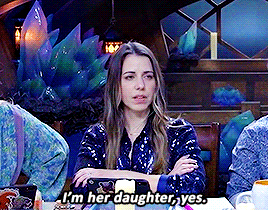
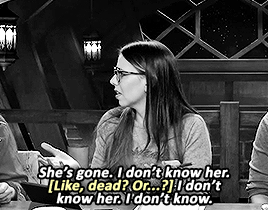
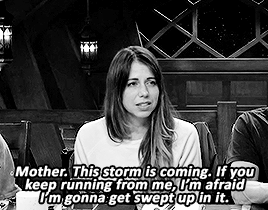
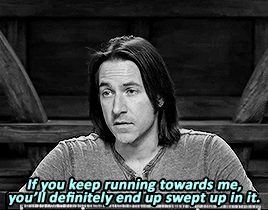
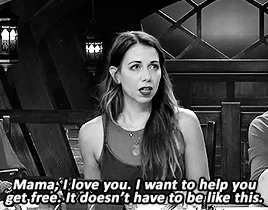
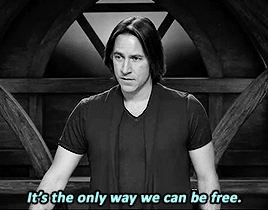
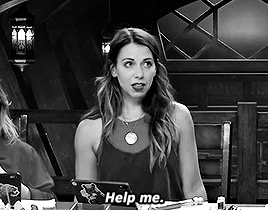
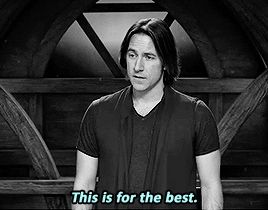
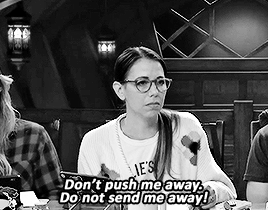
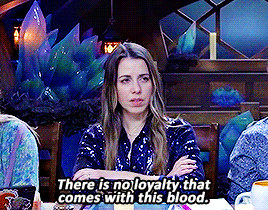
We want to destroy my mother.
(insp by @dadrielle)
#critical role#criticalroleedit#imogen temult#liliana temult#laura bailey#matthew mercer#gifs#*#*cr#cr3#cr spoilers#angst tag#cr meta#nova shh#scheduled#3h12m c3e88#18m c3e12#3h17m c3e42#3h42m c3e51#4h20m c3e51#1h35m c3e49#i think this gifset might be a little bit unfair to liliana from a third party perspective but#i think it's Very Real for imogen. to feel like she reached out so many times and the loyalty there was so fucking flimsy#barely there to begin with and then gone in an instant as everything turned to red mist#thinking about how laura on 4sd a while ago said imogen is so fucking sick of it she's sick of having that hope#her reality is that her mother no longer has any loyalty to her and the pain of thinking she does isn't worth it anymore#:((((#'help me.' 'this is for the best.' breaks my H E A R T :(((((((((#and matt's fucking Smile afterward. speaks a thousand words#thanks rj for the discord message that kicked this off!!!
951 notes
·
View notes
Text
One thing that I think a lot of Disco Elysium meta misses (likely because a lot of it is very clearly written by young Americans writing from an intensely American-centric cultural perspective without even really realizing it) is that one of the singular and central themes of the game is massive-scale generational trauma in a home that is economically collapsing as its resources and people are being drained by an occupation. People have noted that no one tries to help Harry, despite the fact his mental illness is incredibly obvious to everyone around him. He tells Kim that he completely lost his memory, and Kim politely asks him to focus on the work. He tells Gottlieb that he had a heart attack, and Gottlieb tells him that if he’s still alive it couldn’t have been that bad. That he’ll drop dead sooner or later, but then so does everyone.
And that’s the most important thing: so does everyone. Look at Martinaise. Look at the world in which Harry lives. It is not our own, but it is adjacent to ours. More specifically, it is clearly adjacent to the states of the Eastern Bloc: overtaken and occupied by a faraway government that clearly doesn’t care about Revachol or its people. And that is obvious in every tired face, every defeated citizen, everyone trying to eke out a little happiness or meaning in spite of the overwhelming trauma and damage around them. The buildings are still half-destroyed. The bullet holes are still in the walls. The revolution was decades before, but it still feels to the people there like a fresh wound. The number of men of Harry’s generation who are not alcoholic or otherwise deeply fucked up are very few. Some, like Kim, hide it better, but the deeper you dig into his history, the more you realize how damaged Kim is. He’s more than a little trigger happy, and hates that about himself, but he is a product of his environment: Kim’s entire life is seeing people he cared about shot and killed, so his instinct now is to shoot first himself, to protect those few people left who still matter to him.
Harry is not unique in his trauma. He is a distillation of an entire culture of people who tried to rise up and make something beautiful, and were instead routed and occupied. He is trapped between the occupation and the people on the ground, along with all the rest of the RCM. Their authority comes from the occupying government, but it is implied that they were formed out of the remnants of the citizens militia which sprung up from Revachol itself as a way to try to mitigate some of the horrors being committed on its streets. The Moralintern sure as hell wasn’t going to get their hands dirty, so they happily conscripted (and therefore could better control) this group, who are only recognized in certain places, and whose authority mostly amounts to giving out fines. The RCM is corrupt, but it is corrupt in the same way its culture is. Bribes are considered standard with them, not a moral failing, but a necessity, so long as those bribes are correctly logged as ‘donations’. It’s how the RCM stays afloat, and the rest of Revachol completely understands that. Everyone would take a bribe if it meant they kept eating. Everyone would take a little under-the-table money if it meant keeping a roof over their heads. The officersof the RCM certainly don’t make enough to see a doctor. They have an in-house lazarus, and if he can’t fix them they just die. Mental health care? What mental health care? Harry doesn’t get it for the same reason no one else does: it doesn’t really seem to exist. There are no counselors, no psychologists, no psychiatrists. How would they even start? If the world is what is broken, if everyone is suffering a similar catastrophic amount, it makes sense that Harry’s trauma would simply get rolled up with all the rest. Kim asks him to get on with the job because Harry’s suffering is not remarkable in Revachol. He is one of an entire generation who have an astronomical number of orphans from the revolution, and so many younger people are left more or less orphans as their parents drink themselves into oblivion like Cuno’s father. So Harry’s truly unique attribute is embodying all that trauma, having it all inside of him, filling him to bursting.
To really engage with the themes of the game, engaging first and foremost with the reality of Revachol is imperative. Imposing our own reality onto Revachol, particularly if coming from an American perspective (which tend to have the habit of both viewing the world through an American lens and not realizing they’re doing it because they’ve never experienced a different lens), will always feel shallow to me because of this.
All that is to say, I would love to hear some more explicitly European meta about this game, and especially Eastern European meta. If anyone can point me to some good, juicy essays from that perspective, I would be grateful!
#Disco Elysium#is such a good game#but I found a lot of the meta around it frustratingly shallow#and very VERY American#which is also frustrating#given how clearly Eastern European the roots of this game are#I have no problem with people using a game or other work of fiction to inform their own lives and experiences#but I find it strange when people engage with the game#as though it was coming from an American perspective#asking why certain things happen or didn't#based on how they would play out or have played out in America#anyway this a rambly way to request some meta from other cultural perspectives#I am very interested in reading it!#Disco Elysium meta
2K notes
·
View notes
Text
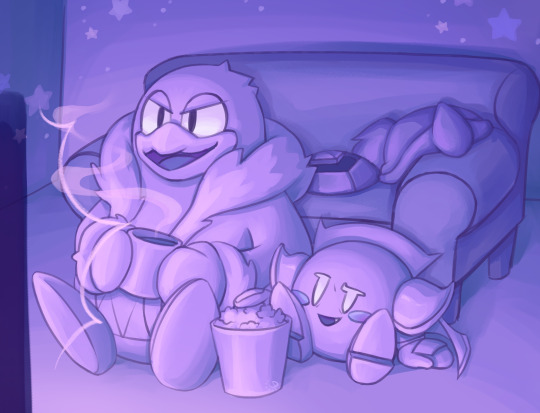
late night TV
#i wanted a break from worrying about anatomy drawing people so i drew kirby. but then i decided to draw a couch in perspective. auhgh#kirby#kirby fanart#meta knight#king dedede#metadede#art stuff
443 notes
·
View notes
Text
I feel like people really underestimate the importance of Dick being the first Robin. Like, reverse Robin AUs are interesting and such, but I just hope people realize that in the context of canon, they would never work. The reason Batman and Robin ever works is because the first Robin was Dick Grayson specifically. Because Bruce would never have taken in any child if Dick's tragedy hadn't specifically happened to mirror his own experience. Dick Grayson was the only one Bruce truly saw himself in first, because the fundamental event that defines them is the same. And he sees the opportunity to help someone the way he was never helped, to make sure that Dick didn't go down the dark path he did. So, my point here is that the only one Bruce actually made the choice to take in, the only one who could kickstart it all, is Dick Grayson, because he is the only one with whom Bruce could immediately empathize and connect with.
This never happened with any other Robin. He took in Jason because he missed Dick, he took in Tim because Tim forced himself into the role, he took in Steph because he was trying to make Tim come back to being Robin, and Dick made Damian Robin. Of course, he loved all of them, and they all have their unique relationships with Bruce that are very important and inform their characters, and he does need them too. But he specifically formed this connection with Dick that made Dick the only person he ever considered taking in. It took a very specific set of circumstances in Dick's backstory that made Bruce commit an impulse adoption that just isn't really present in any other Robin's story. And the reason Jason or Tim or Steph or Damian or anyone else whom Bruce has taken under his wing even got that chance is because of the work Dick Grayson put into Bruce Wayne.
Before Dick, Bruce was reckless and didn't care at all about himself, to the point of almost being borderline suicidal. He was more brutal, more violent, etc. The reason all this changed, is because of Dick Grayson specifically. He was the one with whom Bruce opened up, with whom Bruce was forced to grow up, to take responsibility and learn to take care of both Dick and himself. Dick, to Bruce was the one who brought "color to their [his and Alfred's] monochrome lives." Dick Grayson's specific brand of happiness and joy changed Bruce for the better. Dick gave Bruce hope. This is true for other Robins too, but only because they followed the precedent that Dick Grayson set, only because they slid into his role (they have their own interesting relationships with Bruce, but this specifically is from Dick that other Robins carried on. A legacy, if you will). Dick Grayson turned Bruce into the kind of man who would become a serial adopter.
Without his influence, without his precedent, there would be no Batfamily, because Bruce would never have gotten to the point where he would be able or willing to take in someone else and care for them properly (It took living through his trauma again to get him to take Dick in lmao). Hell, there would be no Batman because Bruce would have gotten himself killed a long time ago if Dick hadn't helped him learn self-care. Dick knows Bruce best, because he understands him on a fundamentally deeper level than anyone else in the world. And he's the only one who can make Bruce open up at his rawest, most downtrodden state. He is the only one who can give Bruce at his lowest that kind of hope. There is no Robin without Dick Grayson. It's literally a tribute to his parents, using their colors and the name his mother called him. He created that identity as a symbol of hope. He helped Bruce become the kind of man who could and would let other people that he had to care for into his life. Without Dick Grayson, you can simply forget about any other Robin or the Batfamily as a concept even existing.
#DC#DCU#DC Comics#Bruce Wayne#Batman#Dick Grayson#Jason Todd#Tim Drake#Stephanie Brown#Damian Wayne#Nightwing#Red Hood#Red Robin#Spoiler#Robin#The Batman 2022#Robin I#My meta#Meta#TL;DR Dick Grayson is the only one who is emotionally intelligent enough to be an emotional crutch to pull Bruce Wayne out of the darkness#And without him Bruce never would have taken in anyone else#This post is mainly about The Batman 2022 btw#I see a lot of people asking for Robin but they want Jason to be the first Robin for some reason#And that's interesting but Bruce doesn't need just a Robin. He needs Dick specifically#That's what's best for his character progression and it makes the most sense from a thematic perspective too#But that's for another post
328 notes
·
View notes
Text
I think it’s so interesting that Kui decided to show us how differences in lifespan affect tallmen and elf relationships from both angles with Kabru and Thistle and also how that reflects real-life abusive situations. And then goes on to deconstruct that by showing how genuine understanding and respect CAN exist between the races with other characters!
Kabru being raised by an elf (who is shown to only have a superficial respect for short-lived races, the same one might have for a pet in a lot of ways) and treated like a child even though he’s in his 20s. After all, a 20 year old elf would be a kindergartener, and Milsiril seems to have a rather toxic combination of overprotectiveness and dehumanizing tendencies that leads to perpetually seeing the children she raises as children, even well into adulthood for their race.
And yet, we see with characters like Otta that this doesn’t have to be true of EVERY elf (nor should it logically be, especially those who spend actual time around short-lived races.) For all the jokes made at her expense I actually think it’s really interesting that she’s also canonically queer since recognizing the agency and maturity of short-lived races is in itself a type of queerness in elf society from what we’ve seen. Senshi too, as funny as his misconstruing Chilchuck as a child is I think it’s really important that he realizes his mistake and rethinks his assumptions on short-lived races following his example. It doesn’t HAVE to be the way it is, but it will take work on each side to improve things.
Then on Thistle’s end… woof. Complete opposite of Kabru, it was difficult for the tallmen of the golden kingdom to comprehend how someone in their, like, 60s could still behave like a teenager and chalked that up to a personal and moral failing rather than literal differences in biology (kind of an autistic mood but that’s a conversation for later.) It’s just as disturbing as Milsiril’s treatment of the children she adopts really, since they explicitly didn’t want an adult that could exert their own agency and control over their situation. And the thing is it’s not like that’s totally uncalled for, the previous points show how a non-insignificant number of members of long-lived races do genuinely see short-lived races as inferior, or are otherwise ignorant, like with below.
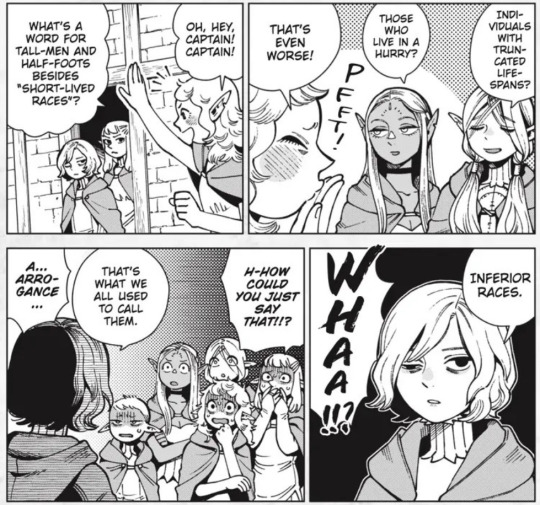
It ended up working out just how they wanted, because Thistle’s child-like innocence and singleminded desire to make the only family he had happy meant he was never going to do anything he didn’t think would help them… which then backfired, because of course it would. It’s overcontrolling and manipulative parenting, but with the added spice of lifespan differences and magic. Kabru ended up detesting the elves that raised him and wanting nothing to do with them, and Thistle basically had a massive breakdown trying too hard to please everyone. Infantilization vs adultification, as some have said, with predictable results.
#polly speaks#dungeon meshi#dungeon meshi spoilers#dunmeshi#delicious in dungeon#kabru of utaya#thistle dungeon meshi#child abuse tw#to be safe#ask to tag#sorry for the milsiril hate I’m willing to hear perspectives but everything about her icks me out#dungeon meta
310 notes
·
View notes
Text
Good Omens: Lockdown and Crowley not mentioning his living situation in S2*
*till S2E6 when he asks if he can have his apartment back bc he's bored of living in his car but Aziraphale doesn’t hear bc mentally he’s in Alpha Centauri.
Having read the 'Crowley doesn't tell him' Neil Gaiman ask close to when I first listened to Lockdown (I lived under a rock until recently), my initial thought was HAS HE BEEN LIVING IN HIS CAR FOR YEARS?! but I think he was still in his apartment in 2020:
as far as Hell knows, Crowley just had a pool party in holy water (the holiest) so the higher-ups are probably willing to give him some space (plus Beelzebub is busy going on pub dates w Gabriel)
while there should be ~8 months between the end of Season 1 events (The Very First Day of the Rest of Their Lives on Sunday, Aug 25, 2019) and the Lockdown phonecall (on or near the 30 year anniversary on May 1, 2020), I can't imagine that's a very long time for Hell, especially if you're understaffed and busy dealing with fallout from Almostgeddon / going on pub dates
Shax dropping off mail and asking about the boiler seems like something one does in the first few months of living somewhere, not ~3 years in (if S2 is in 2023)
That said, I think the phone call underlines why Crowley never directly tells Aziraphale that he is living in the Bentley in S2, and it's just a great conversation (all hail Gaiman) sooo I wrote about it:
***Note: This post analyzes the Lockdown phonecall from Crowley's perspective only. Our heroine is feeling quite emotionally vulnerable at this point in time so things are going to hit him harder than they normally would.
I do not think Aziraphale meant to cause him pain (!!) but Crowley can't see that yet and I've written this post in a way that reflects that missing insight. (I explain in more detail in this reblog if you are interested) I am working on a companion post for Aziraphale's side of this conversation and how I think it affects his behavior in S2 because if we know anything about these two, it's that their exactlys are different exactlys.***
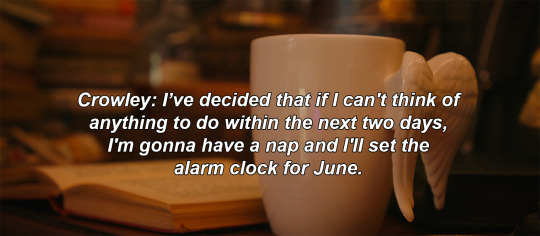
Crowley’s habit of sleeping to skip time like an RPG character by a campfire amuses me to no end, but in this context it feels heavy. Crowley already worries about losing time with what he loves and he probably hoped things would be different between him and Aziraphale after the events of S1. But things don’t change much. Then lockdowns start, and Crowley is trapped in his apartment alone, transcendentally bored, and unable to make his brain shut up. Sleeping a month away starts to sound less awful.
But Crowley hasn’t given up yet; he’s still awake when Aziraphale calls, and he’s even giving it two more days. Was he waiting for Aziraphale to call? Is it even possible not to at least kind of wait for someone’s call when you are cut off from everything and the caller has been your only friend and crush for millennia?
Aziraphale asks why Crowley isn't "out and about" tempting people or setting a bad example and he responds:
C: Everyone's so miserable and cooped up right now anyway, and I just… well… don't have the heart for it.
A: *glowing audibly* I'm not miserable~
C: Really?
Crowley sounds genuinely surprised at Aziraphale's happiness and quickly assumes it's because the angel has been around people. He's so lonely/depressed/in his own head that he hadn't even considered someone enjoying being 'cooped up'. *sob*
Aziraphale goes No actually I put the closed sign up in the window and I'm having the Time of My Life, never had so few customers, not in 200 years!, etc. Although, he says:
A: …There were a few young lads a couple of nights ago who broke in through the back and tried to steal the cashbox! But they soon saw the error of their ways~
C: *clearly amused* Did you smite them with your wroth?
A: Well I certainly gave them a good talking to, and I sent each of them home with cake~
C: *annoyed, swooning* Cake?
A: Quite a lot of cake, actually.
C: *physically ill from having such a giant crush on this dumbass baker/security guard* eeeekkkgghhh I'm gonna regret asking but.. ...rrgh..
*30 seconds of Aziraphale joyfully describing his baking while Crowley probably tries very hard not to imagine the angel eating each item in sensual slow motion* I stg you can hear him struggling in the background once or twice
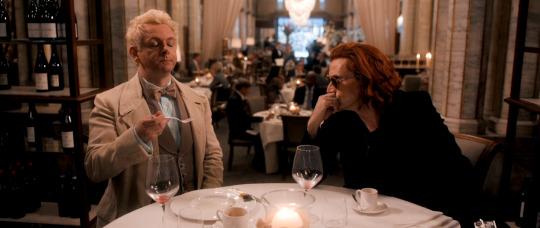
A: …And once I've baked them, I have to eat them all myself, which was why I was so delighted—
C: To send your burglars home laden with baked goods, yes, nnyeaayeah I follow…
Crowley interrupts, finishing Aziraphale's sentence in his nervous hurry to say the next bit:
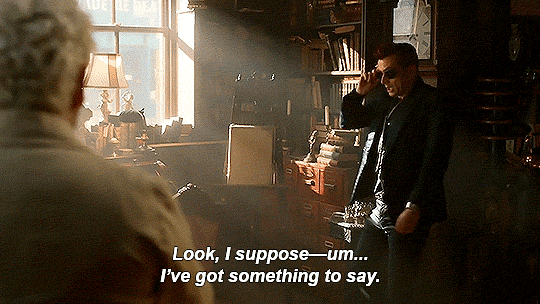
C: *loud inhale* You know, I could.. hunker down at your place. … Slither over and watch you eat cake. I could bring a bottle--a case of… something… drinkable…?
He's trying to sound so casual about it but this is someone who was rejected/abandoned by actual literal God after asking what he thought were welcome, uncontroversial questions. Asking makes him vulnerable. He's supposed to be the rescuer, not a demon in distress. He does not feel casual about asking.
Crowley knows it's unlikely but he's so miserable and desperate for company that he can't help but ask, just in case. Even the smallest chance of spending time trapped indoors with Aziraphale—with nothing to do but drink, watch him eat, and talk about things they'd normally avoid—is too tempting.
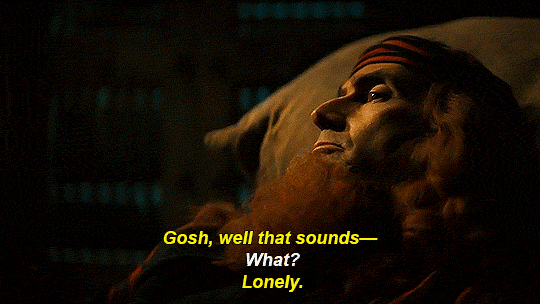
A: *panicking* Oh I— I— I— I— I'm afraid that would be Breaking All The Rules! *nervous breathing* Out of the question! I'll see you… when this is over.
C: Right. gnnehh. I'm setting the alarm clock for July. Good night, angel.
*dial tone*
And just like that, Crowley doesn't need two days to decide. The depression nap doubles in length. He doesn't hear how badly Aziraphale wants to say yes behind the fear, or maybe he does and it hurts worse because why isn't Crowley enough for him? You can almost hear the spiralling:
SHOCKING, asking made it worse. It always does doesn’t it? Why even bother? you just embarrass yourself.. SLITHER over? why did I say that *grumble grumble* of COURSE His Holy Holiness, your only friend in the universe, would rather eat cake by himself while everything goes to shit than ~deign~ to have you in his presence. "AsK aND yE sHaLl ReCeIvE" bugger this for a lark im going to bed
(a bit dramatic but we've all been there)
I imagine sleep doesn't come right away. Maybe his thoughts drift to when he sat beside the angel at a dark Tadfield bus stop after a rather eventful Saturday. Crowley must've felt a tiny bit hopeful when he invited Aziraphale to stay with him: Heaven had withdrawn its favor and the bookshop was gone; Aziraphale was like him now. Didn't that mean things would change?
"I don't think my side would like that." Apparently not.
In the end, Aziraphale did ride the bus back to Crowley's apartment and stayed till the next morning when he caught a cab, but only to sell the illusion. Crowley understood that as far as sides went, the angel was still on Heaven's, even if Heaven wasn't on his.
And now this: the entire world is shut down; there is nothing for Aziraphale to do but stay in and read and bake in his magically reconstituted bookshop and he still won't invite Crowley in. Burglars and un-fallen angels only—nobody who asks questions.
So... of course Crowley doesn't tell Aziraphale when he loses his apartment. He already knows what answer he would get; the angel has told him so many times. Aziraphale is a company man first, a companion to one very sad owl when convenient.
If Crowley works up the courage to say 'please take me in, I have nowhere else to go' and Aziraphale goes 'sorry, no, far too political, but I WILL risk being erased from the Book of Life to protect this nude amnesiac former coworker who always hated me,' it's going to be too much. You can't sleep long enough for that type of hurt to go away. Better not to say anything.
"Then nothing has to change, does it?"
#edited to add the note about crowley's perspective right after the cut! apologies if it seemed anti-aziraphale before!#good omens meta#good omens lockdown#good omens 2#ineffable husbands#ineffable spouses#ineffable divorcees#i can't even imagine navigating the pandemic brain scramblies while pining THAT HARD#Aziraphale is a company man (gn) but i think S3 will cure him of that#long but if i can't write essays about this on tumblr then where#good omens spoilers
753 notes
·
View notes
Text
One of the many things I find funny and irritating is the slant of a lot of interpretations of Alecto's name (that it's about feminine rage)--on this here wlw internet in the year of our lord 2024, it's easily made to figure as rage against God, or rage against patriarchy, or religious oppression, and therefore an allusion to the idea that she's going to get her vengeance on John for betraying and oppressing her somehow, but like
John is the one who named her Alecto. He's the one who named her that. So, naming her "Alecto" is alluding to the embodiment of John's rage--their rage, since they are joined inseparably (John even explicitly says that when he first perceives her: "You wouldn't stop screaming. You were so scared. You were so goddamn mad").
He says of Alecto to Harrow, "In a very real way, you are [Alecto's] children". At a very surface level, Alecto is (depending on the text or tradition), one of the Furies--famously, in several surviving Greek tragedies, who punish Orestes for the crime of killing his mother. In fact, in Aeschylus' Oresteia, they declare that they are specifically bound to avenge matricide.
So the name "Alecto" alludes to the nature of John's mission and how he sees it.
It also implies that his divine rage, the rage that gives him power, the power that makes him divine, that he either represents or wants to represent, is feminine rage. He was chosen by Earth (which, Furies are sometimes the daughters of Gaia); he is her champion, however he's managed to fuck that up. Once the truth of that comes out, it becomes clear that all of his power comes from her.
And that's why you get statements from Tamsyn Muir like:
“[T]he God of the Locked Tomb IS a man; he IS the Father and the Teacher; it’s an inherently masc role played by someone who has an uneasy relationship himself to playing a Biblical patriarch. John falls back on hierarchies and roles because they’re familiar even when he’s struggling not to. Even he identifies himself as the God who became man and the man who became God. But the divine in the Locked Tomb is essentially feminine on multiple axes – I think Nona will illuminate that a little bit more."
So yes, he plays the role of Emperor and God and Teacher, with all of the things that implies. And I don't think it should be discounted. But he also is (and partly sees himself as) the chosen champion of a goddess, or what is for all intents & purposes for a human like him a goddess. He is her avenger, and while she sleeps, her avatar.
And I don't think we're meant to read him purely as a parasite who's taking advantage of her to gain power for himself, either. Or an oppressive, Kronos-like figure. Especially if you consider Palamedes' theory of the Grand Lysis, even if he was purely motivated by desire for power before (which I really doubt), there are parts of each in the other, now. What was clear and separate before is uncertain and interpenetrated. Is his rage his own, or hers? Is his mission of revenge his, or hers? If he wants power, is that his own selfishness, or her desire to survive?
And does it matter?
#the locked tomb#tlt meta#john gaius#i really wish there wasn't such an intense desire to find the worst possible interpretations of johns' actions#because like. they're plenty hurtful on their own! they're plenty shitty!#there IS however something tamsyn muir is trying to express through the series and it's fairly complicated-otherwise it wouldn't be a serie#and i don't think it actually helps us to turn john into a cardboard cutout labeled 'evil'#or apply tropes we've marinated in from radfem-informed segments of online wlw culture about how men are parasites on the Divine Feminine#or apply the messages of other shows with a big emphasis on queer and wlw themes--like spop--to something that just fundamentally isn't the#there is more than one way to talk about lesbian religious trauma and there is more than one narrative around it#and more than one perspective on it#i wish that people would try harder to experience the story on its own terms
227 notes
·
View notes
Text
I think the key component to my personal reading of post-Delphi Pharma is that he's trying to be a horrible person on purpose. Not "on purpose" in the way that people have free will to exercise their own choices, but in that Pharma's "mad doctor" persona is a performance he puts on to deliberately embrace how much everyone else hates him. Basically, if people already think you're a "bad Autobot" and a horrible doctor who just kills his patients for fun, why try to prove otherwise to people who have already made up their minds about you? Just fully embrace the fact that people see you as an asshole. Don't try to change their minds. Don't plead for their forgiveness or understanding. Just stop caring. If you're going to be remembered as a monster, you might as well be a memorable monster, and eke as much pleasure and hedonism as you can out of it before karma catches up to you and you inevitably crash and burn.
I mean, I guess you could just go the route of "Oh, Pharma was always a fucked up creepy guy and Delphi was just him taking the mask off," but I really don't like that interpretation because, for one, it feels really wrong to take a character like Pharma becoming evil under duress and going, "Oh well clearly he did the things he did because he was evil all along," as if somehow Pharma breaking under blackmail/torture/threat of horrible death was a sign of him having poor moral character. As opposed to, you know, suffering under the very real threat of horrible death for himself and everyone he cares about while being manipulated by a guy who specializes in psychological torture.
The second reason is that it just doesn't make sense to write Pharma as having been evil all along. I mean...

Occam's Razor says that the best argument is the one with the simplest explanation. Doesn't it make way more sense to take Pharma's appearances in flashbacks, his friendship with Ratchet, his stunning medical accomplishments, and the few we see of him speaking kindly/sympathetically (or in the least charitable interpretation, at least professionally) towards his patients and conclude "This guy was just a normal person, if exceptionally talented." Taking all of these flashback appearances at face value and assuming Pharma was being genuine/honest is a way simpler and more logical explanation than trying to argue that Pharma for the past 4 million years was just faking being a good doctor/person. I mean, it's possible within the realm of headcanon, but the fact is Pharma's appearances in the story are so brief that there simply wasn't room in the story for there to be some sort of secret conspiracy/hidden manipulation behind why Pharma acted the way he did in the past.
I just can't help but look at things like Pharma's friendship with Ratchet (himself a good person and usually a fine judge of character) and the fact that even post-Delphi, pretty much every single mention of Pharma comes with some mention of "He was a good doctor for most of his life" or "He was making major headways in research [before he started killing patients]" which implies that even the Autobots themselves see Pharma's villainy as a recent turn in his life compared to how for "most of his life" he "used to be" a good doctor.
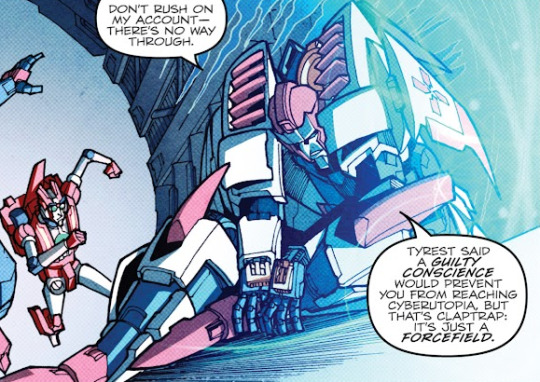
And although Pharma doesn't know this, we as the readers (and even other characters like Rung) know about Aequitas technology and the fact that it actually works, so... if Pharma really was an unrepentant murderer, why couldn't he get through the forcefield too? The Aequitas forcefield doesn't require that a person be completely morally pure and free of wrongdoing or else how could Tyrest get through, just that they feel a sense of inner peace and lack feelings of guilt. Pharma has murdered and tortured people by this point, and put on quite a campy and theatrical show of how much he sees it as a fun game, so why then can he not get through?
It circles back to my headcanon at the start of this post that the "mad doctor" persona is just that-- a persona. Delphi/post-Delphi Pharma's laughing madman personality is just so far removed from every flashback we saw of him and everything we can infer based on how other people see/saw him before that, to me, the mad doctor act is (at least in large part, if not fully) a persona that Pharma puts on to put his villainy in the forefront.
To avoid an overly simplistic/ableist take, I don't think Tarn tortured Pharma into turning crazy. To me, it's more like the constant pressure of death by horrific torture, the feeling of martyrdom as Pharma kept secret that he was the only one standing between Delphi and annihilation, the physical isolation of Messatine as well as the emotional separation from Ratchet, being forced to violate his medical oaths (pretty much the only thing Pharma's entire life has been about), etc. All of that combined traumatized Pharma to the point that the only way he could avoid cracking was to just stop caring about all of it. Because at least then, even if he's still murdering patients to save Delphi from a group of sadistic freaks, Pharma doesn't have to feel guilty and sick about doing it. As opposed to the alternatives, which were probably either going off the deep end and killing himself to escape, or confessing to what he did and getting jailed for it.
In that light, Pharma becoming a mad doctor makes sense. It avoids the bad writing tropes of "oh this character who was good his entire life was actually just evil and really good at hiding it" as well as "oh he got tortured and went crazy that's why he's so random and silly and killing people, he's crazy" and instead frames Pharma's evil as something he was forced into, to the point where in order to avoid a full psychological breakdown and keep defending Delphi, he just had to stop caring about the sanctity of life or about what other people might think of him.
Then, of course, the actual Delphi episode happens, and Pharma's own lifelong best friend Ratchet basically spits in his face and sees him as nothing more than a crazy murderer who went rogue from being a good Autobot. Then Pharma gets his hands cut off and left to die on Messatine. At that point, Pharma has not only been mentally/emotionally broken into losing his feelings of compassion, he's received the message loud and clear: He is alone. Everyone hates him. Not even his own best friend likes him any more. No one even cared enough about him to check if he actually died or not. He will only ever be remembered as a doctor who went insane and killed his patients.
So in the light of 1. Having all of your redeeming qualities be squeezed out of you one by one for the sake of survival and 2. Having your reputation and all of your positive relationships be destroyed and 3. People only know/care about you as "that doctor who became evil and killed his patients" rather than the millions of years of good service that came before.
What else is there to do but internalize the fact that you'll forever be seen as a monster and a freak, and embrace it? People already see you as a murderer for that blackmail deal you did, so why not become an actual murderer and just start killing people on a whim? People already see you as an irredeemable monster who puts a stain on the Autobot name, so why beg for their forgiveness when you could just shun them back? You've already become a murderer, a traitor, and a horrible doctor, so what's a few more evil acts added to the pile? It's not like anyone will ever forgive you or love you ever again.
Why care? Why try to hold on to your principles of compassion, kindness, medical ethics, when an entire lifetime of being a good person did nothing to save you from blackmail and then abandonment? Why put yourself through the emotional agony of feeling lonely, guilty, miserable, when you could just... stop caring, and not hurt any more?
#squiggposting#pharma apologism#i'm sure the doylist reason for the writing is just that pharma was a designated villain#so since he's a villain and 'crazy' it's fine for everyone even the good guys to treat him like complete trash#i just think from a watsonian perspective taking a sympathetic approach is way more interesting and logically consistent#what i mean is like. from a meta perspective one of the best ways to show that a character is super evil and not worth saving#is when even the good guy heroes. the ones who are supposed to be kind and compassionate and wise. see him as dirt#and this is also kind of a necessity in most plots bc TF is the kind of series that just needs action villains and long-term antagonists#so not every villain is written or has a plot to be made redeemable. and pharma is one of these bc he's not important or a legacy character#so from a doylist (meta) perspective you could read the autobots' disregard of pharma as a sign of#'this guy is not meant to have your sympathy as a reader. pay no attention to him'#but from a watsonian (in universe) perspective it paints a miserable picture of pharma being utterly forsaken by the ppl he served alongsid#and like yeah i'm super autistic about pharma so of course i view him with sympathy but like#the idea of being a loyal and good person for years only to be subjected to a Torment Nexus of#being blackmailed into breaking all of the oaths you held sacred. under threat of you and all your comrades dying horrible torturous deaths#then when your comrades find out about it they focus solely on the 'harvesting organs' and not on the 'blackmail' part#and then you get literally left for dead by your comrades and best friend hating your guts#and then you get rescued by a guy who uses you as a test subject for his evil machine#this is a fucking nightmare scenario like pharma could hardly be suffering more if the author TRIED to make him suffer#and for me it's like. the evil pharma did can't be decontextualized to what drove him to that. as well as the question of like#how easily ppl can write someone off as evil and turn a blind eye to (or even find satisfaction in) their suffering bc theyre evil#and either brought it on themselves or it's just karma paying a visit#like. i feel like if pharma WERE a shitty doctor and a terrible person his whole life then the delphi situation would feel like karma#but the way it's written and the lore retroactively put in makes it feel more pharma getting thrown in a torture carousel#and THEN becoming evil. but then being treated as if he was always evil or was some sort of bad apple#bc like i'm not opposed to LOLing when a villain gets a karmic torture/death related to the wrongs they committed#but in pharma's case it feels less like karma and more like endless torture + being abandoned by ppl who should have been more loyal
278 notes
·
View notes
Text
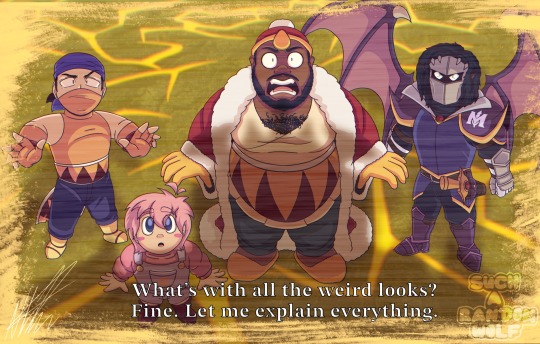
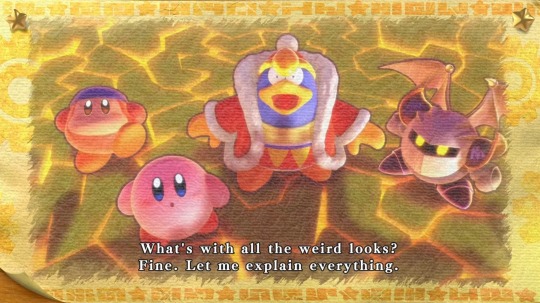
I did a redraw!!
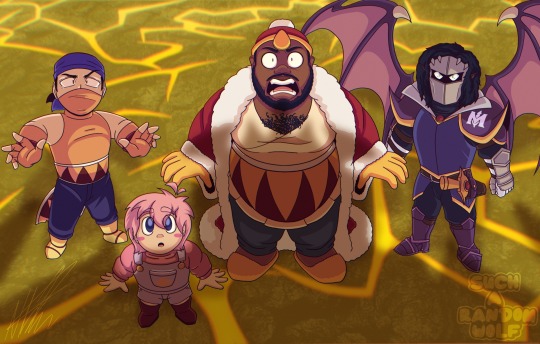
And one without the fun little details
-
All the designs are mine except for the DeDeDe design. The design was made by @//_danktrash but they gave me permission to use it (and they even told me I’m allowed to use It whenever ((that they practically made the design for me 💀))
#I’m very proud of how this came out#especially the perspective because I am NOT good at that lol#I’m having way too much fun with all the Kirby art I’ve been making :3#and I have more planned!#Also If you’ve watched Kirby right back at ya you’d know why I made Meta Knight’s eyes white#kirby’s return to dreamland#meta knight#bandana waddle Dee#king dedede#Kirby#Nintendo#redraw#gijinka#art#digital art#my art#SuchARandomWolf
315 notes
·
View notes
Text
SVSSS fandom really needs to learn what “white lotus” really means because I feel like that would clear up a lot of arguments tbh.
Hint: it probably doesn’t mean what you think it means.
#svsss#luo binghe#zhuixing svsss#I’m gonna post about the trope on my meta blog#but basically a white lotus has a pure and innocent exterior and a manipulative inside#uses perceived helplessness and innocence to their advantage to get what they want from people#LBH is not being seen as pure and innocent and good! he’s seen as being that way to get SQQ’s attention and approval#vs black lotus where he doesn’t care about being subtle and nice to get what he wants#where his intentions aren't actually bad but they appear that way because of the way he goes about it#and his reputation#it’s more complex than this but basically the way you read ‘white lotus’ changes the whole perspective of a lot of things#also I do not mean to be snarky or arrogant with this post!#it is meant to have a comedic/meme-like tone
278 notes
·
View notes
Text
The early 19th century sure was something for our boys (gn). They were taking things at a FAST pace. (If, of course, you’re immortal and need to layer everything under 6 layers of deniability).
Whatever you do, don’t think about how in 1793 Crowley rescued Aziraphale and then they got lunch, in 1800 he brought chocolates to the bookshop then saved Aziraphale from a heavenly promotion, then in 1827 they went on a date to a cemetery in Edinburgh(prime date spot at the time esp for non-trad couples) and Crowley seemed to be having the time of his life.
Then especially don’t think about Crowley getting lightning-sanded down to Hell and showing up 35 years later in a much grumpier mood and with a request for Holy Water as “insurance”.
And don’t think about the context of their last interaction being attempted suicide by poison drink after a partner was lost… no wonder Aziraphale didn’t take the request well and they fought. No wonder Crowley was offended by fraternizing - they’d been way beyond that. Nope, don’t think about any of that.
#I know you can take A’s journal entry in a way that means they met up sooner#but I like this interpretation#lol the whole thing is such a departure from book omens#when Crowley slept thru the 19th century#from a doylist perspective it’s almost certainly to be able to dress the lads in amazing costumes#I approve#the 19th century#good omens#good omens headcanons#good omens s2#ineffable husbands#crowley#aziraphale#good omens 2#good omens meta#aziracrow#a duck talks
424 notes
·
View notes
Text
FCG flipping a coin asking whether to run or fight
It landed on its side
And they definitely did find that third option
#critical role#cr spoilers#i know in the moment matt had an explanation for jt#but looking at it from a story perspective and not the meta bits#it paints quite the picture
209 notes
·
View notes